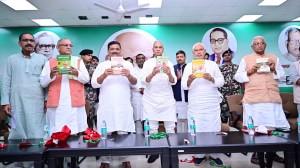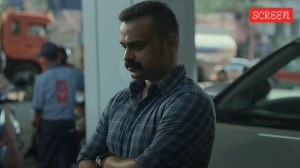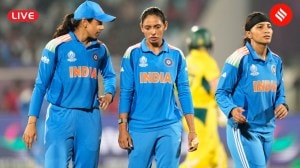Where are the healers?
While you are in India", V.S. Naipaul admonished his sister in 1949, "you should keep your eyes open." More than five decad...

While you are in India", V.S. Naipaul admonished his sister in 1949, "you should keep your eyes open." More than five decades later, we still need to keep our eyes as well as our ears open. Today, millions of people grope in the dark, as they have done for so long, in search of food, water, shelter and health care. Indeed, the problems afflicting the nation are no different from what they were in the first year of the millennium. What is different now is the renewed threat to communal peace from scores of sants and sadhus, backed by the VHP-RSS combine, who have raised the communal temperature over the construction of the Ram temple at Ayodhya.
Historians are no prophets but the writing on the wall is for everybody to see. Social and political grievances will be heightened across the board because of farmer’s unrest, the feverish pace of liberalisation, resurgence of militancy in Kashmir, and the erosion in the popularity of the BJP-led National Democratic Alliance on account of its poor record of governance. To add to the growing uncertainties, new alignments and a massive mobilisation of caste and communal sentiments will precede the assembly elections that will take place in five states this year.
Was India basking in the glory of “spectacular political stability” for the past 15 months? This is surely not the perception of the 17,461 interviewees (conducted by India Today-Org-Marg) spread across 514 parliamentary constituencies in 16 states. Apart from their scepticism over the so-called idyllic stability of the government, the mere fact of a fragile coalition being held together by the prime minister brings no comfort to, among others, the Dalits, the backward castes and the minorities. The persecution of Christians in certain pockets continues unabatedly, whereas the Sikh establishment is up in arms against the activities of the RSS in Punjab. Whether it is Kashmir, Punjab or the Northeast, majoritarianism in any garb will lend weight to divisive forces and add credence to the belief that Hindutva is the new mantra of civil society.
In short, the hope and optimism that had brought Atal Bihari Vajpayee to the centre stage have been belied by the lacklustre performance of his ministers. His own strenuous efforts to project himself as a liberal no longer carry conviction. Starting with his ill-fated plea for a nation-wide debate on conversion and culminating in his ill-advised remarks on the so-called “national sentiment” over the building of the temple, the prime minister has not been able to break free from the RSS stranglehold. Acharya Giriraj Kishore, senior VHP vice-president, has already dismissed his belated plea from Kumarakom for a shift from contention to conciliation and from discord to concord.
Surely, a diverse and disparate nation needs to be anchored in an ideological frame provided by the Constitution. Surely, the architecture of peace and prosperity can be founded on the basis of an inclusive and pluralist agenda. If so, the government’s responsibility is to allay the fears generated by the exercise to review the Constitution. Sonia Gandhi struck the right note in pointing to the danger from within, from those elements that challenge the very basis of the social character and social sacrament that was put together by the framers of the Constitution. Similarly, the CPI and the CPI(M) have rightly criticised the prime minister’s suggestion for a fixed term for our legislatures. This would, if accepted, sound the death knell of parliamentary democracy.
Besides such ominous warnings, we need to underline that higher education has also been the prime casualty over the last 15 months. Doubtless, we require major structural reforms, but there is no reason why the state should retreat from its long-standing commitment to supporting higher education. By all means ensure the flow of private funds, but please do not make it a norm to be enforced in all disciplines and in every college and university. It is true that middle class opinion has largely veered around the idea of privatisation, but its legitimisation, which is inherently based on the exclusion of the less privileged sections of society, may well turn out to be the country’s nightmare.
Perspectives on education, as indeed on other social sectors, must not be determined by market forces but informed by an understanding of the needs of a developing society and the empowerment of its backward segments. My sense is that the politician-bureaucrat combination in Shastri Bhavan does not adequately recognise its own role in bringing about a major socialisation of our society. Having frittered away the opportunity to learn from past mistakes and initiate corrective measures, they have chosen to seek refuge in fanciful ideas and theories that reflect the idiosyncrasies of an individual or two.
A weary Republic, caught up in the quagmire of politicians, needs symbols of unity and harmony not to paper over the existing divisions but to nurture the vision envisaged by its founding fathers. Instead, we invoke sectarian leaders who preached hatred, bigotry and intolerance. Indeed, we may well confer upon them the highest national honour. This is not all. Recently, Amartya Sen talked of India’s tradition of scepticism and the statement of hereticism and heterodoxy. To the very protagonists of our cherished “ancient” traditions, these values seem to have lost their relevance when it comes to extending patronage, funding research projects, rewriting history textbooks, or not letting the Towards Freedom be published. By all means consign the Marxists and “pseudo-secularists” to the dustbin of history, but spare some thought for a generation that needs to rise above sectarian prejudices and beyond the painful historical memories that are revived to create a climate of hate, violence andaggression. A cry goes out from the ramparts of the Red Fort where the National Flag was first hoisted: Somebody has to provide the healing touch to a beleaguered nation.
January 26 will be yet another day in the life of a nation, though perhaps a little more cloudy and misty than the previous year. It is important to salute the memory of the freedom fighters, and yet we must not forget what a poet, far removed from the corridors of power, wrote at Freedom’s Dawn:
Where did that fine breeze, that the wayside lamp
Has not once felt, blow from–where has it fled?
Night’s heaviness is unlessened still, the hour
Of mind and spirit’s ransom has not struck;
Let us go on, our goal is not reached yet.



- 01
- 02
- 03
- 04
- 05



























